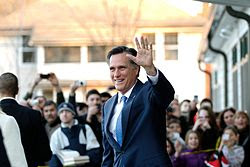Romney’s Foreign Trip: All The Easy Places – OpEd
By VOR
By Dmitry Babich
U.S. presidential candidate Mitt Romney has started his “foreign policy tour” by meeting the British prime minister David Cameron. Whatever the outcome, Mr. Romney already made history by being the most unapologetic Republican presidential candidate in history – at least, on foreign policy issues.
“I am an unapologetic believer in the greatness of this country,” Romney said on the eve of his departure, speaking to the Veterans of Foreign Wars National Convention in Reno, Nevada. “I am not ashamed of American power.”

Being not ashamed of your country’s power is OK, but not being ashamed of extrajudicial killings is another matter. And that seems to be the case with Mr. Romney. What, for example, was his take on president Obama’s orders on killing suspected terrorists (sometimes complete with families and bystanders) by drone attacks, which Obama’s detractors see as a virtual “take no prisoners” policy, described in a famed NYT’s article?
Do you think Romney criticized these “out of court settlements” for being what they are – extrajudicial killings? No, he criticized Obama for allowing these murders to become public.
“What kind of White House would reveal classified material for political gain?” Romney asked the veterans. “I’ll tell you right now. Mine won’t.”
In this way, Romney in fact allied himself to senator John McCain’s theory that Obama deliberately leaked to the press the terrible truth – that the U.S. no longer takes suspects to the infamous Guantanamo prison, killing them instead from safe distance by unmanned aircraft – in order to gain cheap popularity with American voters. If the theory reveals itself to be true, that will be an insult to American voters – what kind of person should you be to condone extrajudicial killings with your vote? By his statement, Mr. Romney revealed that he condones such killings – if they are kept secret.
“Romney is trying to convince the extreme right wing of the Republican party that he is one of them, just your average ultraconservative,” Sergei Rogov, the head of the Moscow-based Institute of United States and Canada said. “But the problem is that he constantly reveals his incompetence on most of the world’s issues. He is just using the ultra-right rhetoric, instead of coming up with a coherent foreign policy program.”
The story with drones is just one more example that tells you something about what age Mr. Romney is living in. The other example is his calling Russia America’s “number one geopolitical foe.” After that statement, made in spring this year, even vice-president Joe Biden, by no means a friend of Russia, whom he last year threatened with “consequences” if Vladimir Putin becomes this country’s president for the third time, – even Biden accused Romney of being trapped in cold war mentality.
Mr. Romney’s trip is planned in a way that would allow him to meet like-minded audiences and avoid bruising questions – a strategy markedly different from the strategy of Barack Obama during his foreign trip of 2008, which he also made in his capacity of a presidential candidate. Great Britain with its Olympic games is an easy venue for reminding people of Romney’s own experiences of helping organize Olympic games in Salt Lake City in 2002. Israel is a good place to boost Romney’s support in the conservative part of Jewish lobby in the United States and abroad. Poland, the final leg of the tour, is a traditional launching pad for diatribes against Russia. Polish conservatives, who still cannot forgive Obama his postponement of the ABM program, which presupposed deployment of surface-to-air missiles on Polish territory, will provide an enthusiastic audience to Romney. The problem is, however, that it is not only enthusiastic audiences that an American president has to deal with, when he finally assumes power.
Romney, unlike Obama in 2008, obviously avoided the most problematic countries, whose relations with the US are indeed controversial – Iraq, Afghanistan, Pakistan, China, Russia. He would not meet many enthusiastic crowds there. But he would probably understand – or at least start understanding – the complications of American foreign policy. And – who knows! – that knowledge could make him somewhat less unapologetic.
